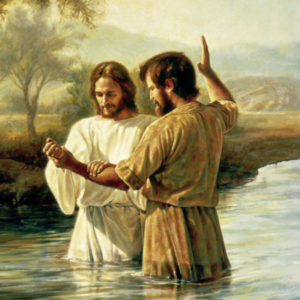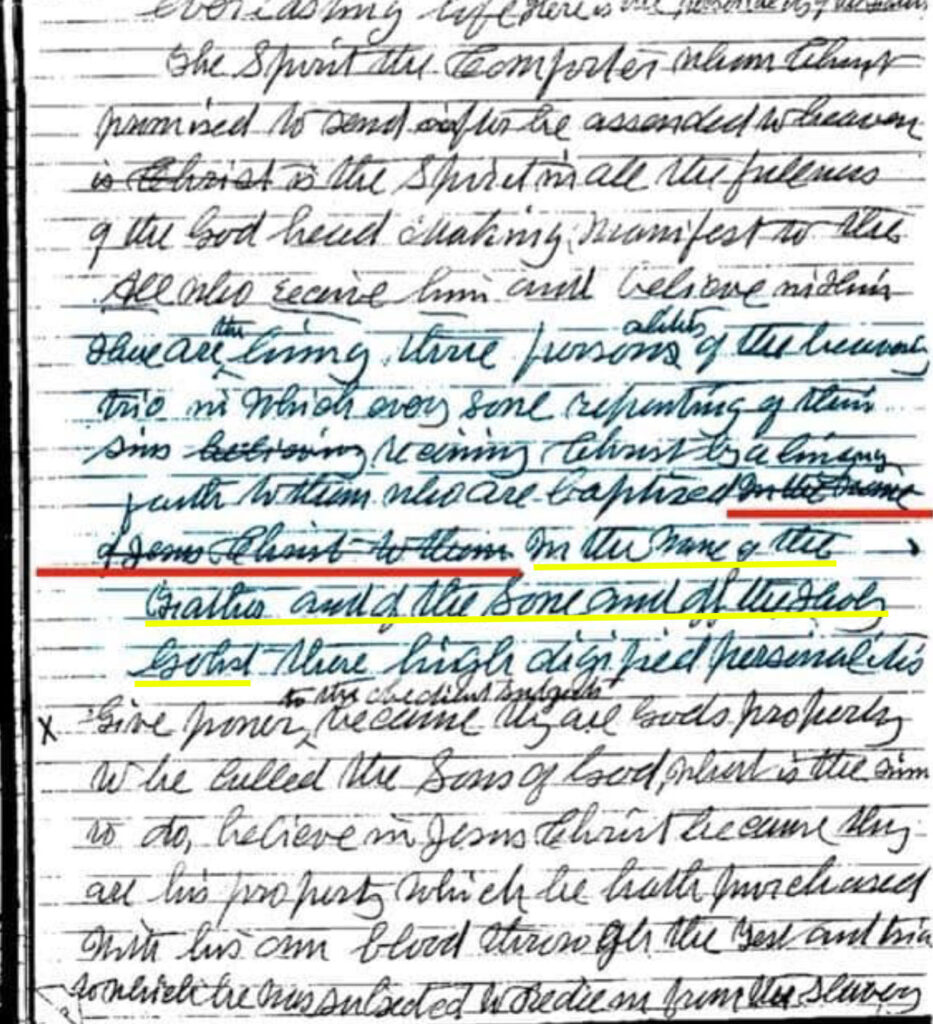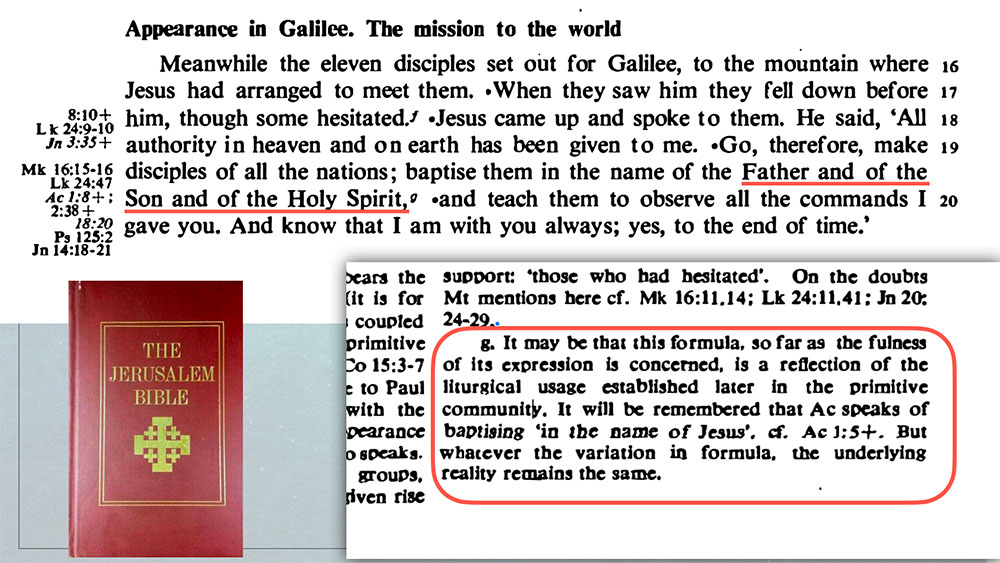The Baptismal Formula

What is the proper formula for baptism? Jesus instructed us to baptism “in the name of the Father, and of the Son, and of the Holy Ghost,” but elsewhere the scriptures record believers were baptized “in the name of Jesus.” Are these contradictions? What name or names should be use in baptism?
Understanding "in the NAME of"
Mathew 28:19 is often quoted when discussing the baptismal formula, but rarely is Matthew 28:18, the preceding verse ever mentioned. And yet, verse 18 is important to understand in order to properly understand what Jesus said in verse 19. These two verses together read:
- “And Jesus came and spake unto them, saying, All power is given unto me in heaven and in earth. Go ye therefore, and teach all nations, baptizing them in the name of the Father, and of the Son, and of the Holy Ghost:” (Matthew 28:18-19)
- “And here he hath authority from the chief priests to bind all that call on thy name.” (Acts 9:14)
- “And when they had set them in the midst, they asked, By what power, or by what name, have ye done this? “(Acts 4:7)
Ellen White has also demonstrated in her writings that the phrase “in the name of the Father, and of the Son and of the Holy Ghost” (Matt 28:19) is a reference to “the authority of the Father, the Son, and the Holy Spirit.”
How did the Seventh-day Adventist Pioneers Understand and Practice Matthew 28:19?
- “Because it is said in Acts 2:38; 8:16, and 19:5, that they were baptized in the name of Jesus, some have inferred that the apostles baptized in the name of Christ only. But this conclusion is very lame. To discover the fallacy of this idea, it will only be necessary to examine the terms of the commission under which they acted.” (J.H. Waggoner, Thoughts on Baptism, pg. 62.2)
- “God’s ambassadors, Christ’s true ministers, by the authority of their great commission, baptize ‘in the name of the Father, and of the Son, and of the Holy Ghost.’ This not only shows the importance of baptism, but that both the Father and the Son, and also the Holy Spirit, have a part in the conversion of sinners. The Father is our lawgiver, Christ our mediator, and the Holy Spirit our reprover, comforter and sanctifier. God pity those who are converted by a gospel that has only the Son in it, leaving the Father out altogether, and immersion supplying the place of the Holy Spirit. It is no marvel that ministers of this sort should depart from the language found in the original commission, and baptize their converts in ‘the name of the Lord Jesus.’”
(“Ambassadors for Christ” James White, Signs of the Times – November 14, 1878)
- “We are baptized in the name of the Father, Son and Holy Ghost. Matt. 28:19. By this we express our belief in the existence of the one true God, the mediation of his Son, and the influence of the Holy Spirit.” (Uriah Smith, 1858, The Bible Students Assistant, pages 21, 22)
- “Every true Christian will say from the heart, When I was baptized in the name of the Father, the Son, and the Holy Spirit, I was buried in the likeness of Christ’s death, and raised in the likeness of His resurrection. I have taken a sacred vow to live in close communion with Christ. I am pledged to devote my life to His service.” (EGW, The Signs of the Times, February 12, 1902, par. eight)
Why Do So Many Scriptures Say We Are to Baptize in the Name of Jesus?
If we take the Bible are our guide, we cannot come to any other conclusion except to understand the instruction of Jesus to baptize “in the name of the Father, and of the Son, and of the Holy Ghost” does not contradict the records that appear where believers were baptized “in the name of Jesus.” Consider this statement from Sister White:
Is Matthew 28:19 a Catholic Corruption?
It is also important to note, that Matthew 28:19 does not say there are three gods, it does not say there are three persons in one God, it does not say they are three in one, it does not say they are co-eternal, co-equal or con-substantial, nor does it say the Holy Spirit is a third person, etc. None of the trinitarian concepts are expressed or mentioned or inculcated in Matthew 28:19. It simply mentions the Father, Son and Holy Spirit, but the mere mention of the Father, Son and Holy Spirit does not make the verses trinitarian any more than the gathering of the disciples on the first day of the week makes Sunday the new Sabbath. Matthew 28:19 is not a trinitarian verse, and Uriah Smith’s statement well illustrates how the non-trinitarian Seventh-day Adventists understood Matthew 28:19.
Ellen White also writes:
- “Let the missionaries of the cross proclaim that there is one God, and one Mediator between God and man, who is Jesus Christ the Son of the Infinite God. This needs to be proclaimed throughout every church in our land. Christians need to know this, and not put man where God should be, that they may no longer be worshipers of idols, but of the living God. Idolatry exists in our churches. [Means had] better be employed to save souls from death, which would be placing jewels in the crown of Jesus Christ and stars in our own crowns in the kingdom of heaven.” (Ms40-1891.78)
- “They have one God and one Saviour; and one Spirit–the Spirit of Christ–is to bring unity into their ranks.” (9T 189)


It is clear then, that what Ratzinger is saying, is that they inspiration for the formulation of the Apostles Creed which “took shape in the course of the second and third centuries” was “fundamentally based” on Jesus words in Matthew 28:19. The idea that this quotation from Ratzinger says that the Catholic Church added or in any way modified the words of Jesus in Matthew 28:19 is a falsehood and is simply not true.
THE APOSTLE’S CREED:
I believe in God,
the Father almighty,
Creator of heaven and earth,
and in Jesus Christ, his only Son, our Lord,
who was conceived by the Holy Spirit,
born of the Virgin Mary,
suffered under Pontius Pilate,
was crucified, died and was buried;
he descended into hell;
on the third day he rose again from the dead;
he ascended into heaven,
and is seated at the right hand of God the Father almighty;
from there he will come to judge the living and the dead.
I believe in the Holy Spirit,
the holy catholic Church,
the communion of saints,
the forgiveness of sins,
the resurrection of the body,
and life everlasting.
Amen.
Let’s look at another quote from the Jerusalem Bible.
There are a few things we may gather from this note that is used to substantiate that Jesus’ words in Matthew 28:19 came from the Catholic church.
1. The author is not using conclusive language, but suggestive. He is suggests “It MAY” not is, but “may” be that this formula, so far as the fulness of its expression is concerned, is a reflection of the liturgical usage established later in the primitive community.” Here, Alexander Jones, the general editor of the Jerusalem Bible, suggests that maybe this formula in Matthew 28:19 came about from later usage from the liturgical, or catholic usage. There is no proof given, no extra-Biblical evidence to suggest this was the case, he is just postulating. His reasoning is that “in the name of Jesus” is used elsewhere, and so he is trying to wrestle with what her perceives is a contradiction.
As we have seen, there is no contradiction. Baptismal events were said to have been “in the name of Jesus,” as to differentiate from the baptism of John, and we saw that the words Paul used for the baptismal formula were the words of Jesus Himself, “in the name of the Father, and of the Son, and of the Holy Ghost.” (Matthew 28:19) This statement from the Jerusalem Bible is not proof of anything other than the suggestive opinion of Alexander Jones, a Catholic scholar educated at “the Gregorian University, and the Biblical Institute at Rome.” (LibraryThing)
What about this statement?
- “It is doubted whether the explicit injunction of Matt. 28:19 can be accepted as uttered by Jesus. …But the Trinitarian formula in the mouth of Jesus is certainly unexpected.” — (A Dictionary of Christ and the Gospels, J. Hastings, 1906, p. 170)
We have already seen that Matthew 28:19 is not a trinitarian formula. So the author’s understanding is incorrect. If we are to base our understanding off of another man’s misunderstandings then we might well gather together a mass of quotes of man’s wisdom and take the most consistent assessment and call it ‘the truth.’ Obviously however, man’s wisdom is not our standard. Even though the supposed Catholic statements saying they modified or added Jesus’ words in Matthew 28:19 is lacking, let us imagine however, that we did find not one, but twenty, or fifty or a hundred statements from the Catholics saying conclusively that they added the text. Would that make it true? What is our authority? God forbid we should determine truth by what comes from the schools, the books and the priests of Antichrist! Rome is not our standard, the Bible is our standard, and we additionally do have the inspired words of Sister White.
What did Ellen White Say About Matthew 28:19?
Ellen White wrote:
- “The Saviour said; ‘Go ye therefore, and teach all nations, baptizing them in the name of the Father, and of the Son, and of the Holy Ghost… These are the words of ‘inspiration.’ You need not fear that you are making a mistake by believing fully in them.” (EGW, RH March 4, 1909)
- “Christ gave his followers a positive promise that after his ascension he would send them His Spirit. ‘Go ye therefore,’ he said, ‘and teach all nations, baptizing them in the name of the Father [A PERSONAL GOD], and of the Son [A PERSONAL PRINCE AND SAVIOUR], and of the Holy Ghost [SENT from heaven to represent Christ]: teaching them to observe all things whatsoever I have commanded you; and, lo, I am with you alway, even unto the end of the world … there is no comforter like Christ, so tender and true. He is touched with the feelings of our infirmities. His Spirit speaks to the heart … The influence of the Holy Spirit is the life of Christ in the soul.”
(Review and Herald, October 26, 1897, par. 9, 15)
- “When I was baptized in the name of the Father, the Son, and the Holy Ghost, I was buried with Christ in the likeness of His death and raised in the likeness of His resurrection. I am pledged to consecrate my life to His service.” {Lt73-1901.}
- “Every true Christian will say from the heart, When I was baptized in the name of the Father, the Son, and the Holy Spirit, I was buried in the likeness of Christ’s death, and raised in the likeness of His resurrection. I have taken a sacred vow to live in close communion with Christ. I am pledged to devote my life to His service.” (EGW, The Signs of the Times, February 12, 1902, par. eight)
- “All power is given unto Me in heaven and in earth. Go ye therefore, and teach all nations, baptizing them in the name of the Father, and of the Son, and of the Holy Ghost; teaching them to observe all things whatsoever I have commanded you; and, lo, I am with you alway, even unto the end of the world.” Just before He left them, Christ gave His disciples this promise of the Holy Spirit, and while the words were upon His lips, He ascended. {ST September 20, 1899, par. 1}
- “Having received their commission from God and having the approbation of the church, they went forth baptizing in the name of the Father, Son, and Holy Ghost, and administering the ordinances of the Lord’s house, often waiting upon the saints by presenting them the emblems of the broken body and spilt blood of the crucified Saviour, to keep fresh in the memory of God’s beloved children His sufferings and death.” EW 100.2)
- “The word which the Lord has given to me for our ministers and our churches is, ‘Go forward.’ ‘All power is given unto Me in heaven and in earth. Go ye therefore, and teach all nations, baptizing them in the name of the Father, and of the Son, and of the Holy Ghost…’” (EG White – TM 417.2)

The scan of Ellen White’s original handwriting taken from Manuscript 21, 1905 shows that Ellen White on at least one occasion, had written “in the name of Jesus Christ” (underlined in red) and later crossed it out and wrote “in the name of the Father, and of the Son and of the Holy Ghost.” (Underlined in Yellow)
Given that Sister White was baptized “in the name of the Father, and of the Son, and of the Holy Ghost” and that she was shown that these words were upon the lips of Jesus, and that “these are the words of ‘inspiration'” and that “you need not fear that you are making a mistake by believing fully in them,” and that she was given these words from the Lord in instruction to our ministers and churches to baptize “in the name of the Father, Son and Holy Ghost,” it is very clear that God has made it clear, that these words are from the Savior Himself, and that in following the formula of His own words, we are indeed carrying out the will and command of Jesus Christ.
Is it Wrong to Still Baptize 'in the name of Jesus?'
Let the principles contained in these statements of inspired counsel guide us in answering this question.
- The question is often asked, “What difference does it make which day we keep for the Sabbath?” But it does make a difference; for the same principle is involved as was involved in Adam’s case. He was put to the same test. For he was to prove by obedience his loyalty to God or by disobedience to forfeit the right to the tree of life. Satan presented this same specious question. What difference does it make whether you eat of the tree of the knowledge of good and evil, or of any other tree of the garden? Adam’s sin consisted in doing the thing the Lord had forbidden him to do, and this opened the flood gates of woe on our world. We should carefully meditate upon the life of Christ, and desire to understand the reason why he came at all. We should search the Scriptures as Christ has enjoined upon us to do, that we may know those things that are testified of him. By searching we may find the virtues of obedience in contrast with the sinfulness of disobedience. “As by one man’s disobedience many were made sinners, so by the obedience of one shall many be made righteous.” {ST April 17, 1893, par. 9}
- Adam did not set his mind in defiance against God, nor did he in any way speak against God; he simply went directly contrary to His express command… No man can be happy and depart from God’s specified requirements, and set up a standard of his own which he decides he can safely follow. Then there would be a variety of standards to suit the different minds, and the government taken out of the Lord’s hands and human beings grasp the reins of government. The law of self is erected, the will of man is made supreme; and when the high and holy will of God is presented to be obeyed, respected, and honored the human will wants its own way … to do its own promptings, and there is a controversy between the human agent and the divine. (RC 56)

